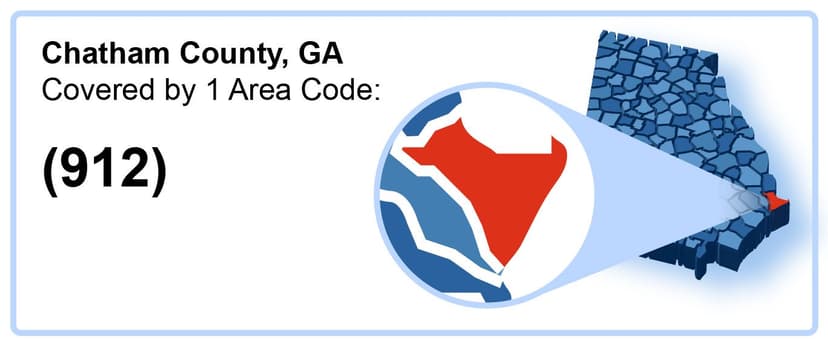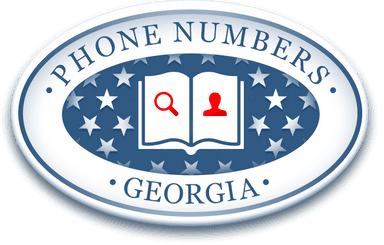What are the Best Cell Phone Plans in Chatham County?

Area codes were introduced as a part of the North American Numbering Plan (NANP) in 1947. An area code is a three-digit number at the beginning of a North American phone number that earmarks a telephone service territory as a Numbering Plan Area within a state. An area code is prefixed to every phone number issued in an NPA to track the origin and destination of calls. The Georgia Public Service Commission (PSC) maintains and implements area codes in Georgia.
Only one area code currently serves Chatham County.
Area Code 912
Area code 912 is the NANP telephone area code serving Chatham County. It was split from the 404 NPA in 1954. Savannah, Pooler, Garden City, Bloomingdale, Tybee Island, Vernonburg, Thunderbolt, and Port Wentworth are communities in Chatham County under area code 912.
There is a marked shift from traditional landlines to wireless telephony services by Georgians. A 2018 survey by National Center for Health Statistics on household wireless telephone substitution in the United States confirmed this. Data showed that 59.0% of adults and 69.2% of children had subscribed to wireless telephone services exclusively. Only 3.5% of adults and 2.7% of children still used landline phones as their sole telecommunications device.
The four national phone carriers, AT&T, Verizon, T-Mobile, and Sprint, as well as some Mobile Virtual Network Operators (MVNOs), provide network coverage in Chatham County. AT&T has the best network spread at 98.75%, followed by Verizon and T-Mobile. Sprint offers the least network coverage in Chatham County. The MVNOs rely on the major carriers to provide network services at cheaper rates.
Voice over Internet Protocol (VoIP) is an alternative telephony service that has taken precedence over plain old traditional telephones in Chatham County. VoIP technology allows subscribers to make voice calls at very cheap rates using broadband Internet connections instead of analog phone lines. VoIP is compatible with cell phones, tablets, computer systems, and landlines (with VoIP adapters). It offers residents functional telephone services that make it flexible and scalable.
What are Chatham County Phone Scams?
Phone scams are deceptive acts perpetrated by scammers using phone services to steal from their targets. Scammers contact unsuspecting Chatham County residents via live calls, robocalls, and text messages, mainly to defraud them of their money or confidential information. Phone scammers spoof Caller IDs to convince their marks into doing their bidding by impersonating legitimate organizations or law enforcement agents.
County residents can use reverse phone number lookup services to identify who called them with suspicious phone numbers. The Georgia Office of the Attorney General encourages county residents to sign up for email scam alerts to stay updated about current scams.
Common phone scams in Chatham County include:
What are COVID-19 Scams?
COVID-19 scams came in the wake of the coronavirus pandemic. Scammers call their targets and promise them test kits and vaccines for a fee. The most recent variant of the scam targeted at Chatham County residents attempts to cash in on the state's vaccine rollout. For a certain amount, scammers will promise residents the vaccine or a spot on a waiting list. They often claim to be part of the state health team assigned to the county and ask their marks to pay for quick access to vaccination.
Conducting free reverse phone lookups can help residents identify these callers and ascertain if such calls are from the state health officials. The Department of Health warns that it will not solicit payment from anyone to get their name on a waiting list or get vaccinated.
What are Tech Support Scams?
Fraudsters are claiming to be with tech companies and calling unsuspecting residents to defraud them. They often request their targets to grant them remote access to their computers under the guise of helping to get rid of viruses. Once admitted into the computers, the scammers will fake repairs on such PCs and then charge unsuspecting targets to remove the viruses. They may also install malware to steal financial or personal information such as Social Security Numbers, card numbers, passwords, PINs, and credit card information.
Tech support scammers capitalize on people's ignorance, using persuasive tactics that convince their marks that their computers are faulty. Residents must verify such calls before taking action. They can do so by performing reverse number lookups on such callers’ phone numbers.
What are Emergency Scams?
Emergency scams are usually targeted at the senior citizens in Chatham County. It is a unique type of scam that preys on family relationships and is often referred to as Grandparent scams or Family scams. The callers typically claim to be family members in distress and in urgent need of financial assistance to resolve some issues or emergencies. They often mention posting bail, medical treatment, and unexpected legal issues as emergencies.
The Chatham County Sheriff Office cautions residents who find themselves in such situations not to act immediately even if the callers sound convincing. It advises them to contact other relatives or call the family member on their direct line to confirm the sincerity of the claims. Also, residents may ask the callers unique questions that can only be answered by close family members. This would serve as a means of detecting fraud attempts. Performing suspicious number lookups can help uncover the identities of such callers. Residents who are victims of this scam can call 1-877-FTC-HELP to file reports with the Federal Trade Commission (FTC).
What are IRS Scams?
Internal Revenue Service (IRS) scams are perpetrated by fraudsters who impersonate IRS officials to request tax payments from county residents. They often spoof their mark's caller identification to display legitimate IRS Taxpayer Assistance Center (TAC) numbers to appear legitimate and ensure compliance. The scammers will claim that targets owe the government back taxes that must be paid immediately. If questioned about the authenticity of their claims, they will resort to threats of deportation, driver's or business license withdrawal, suspension of Social Security Numbers, or arrest.
The IRS has consistently advised taxpayers never to get swayed when they receive calls from persons who claim to be IRS employees, irrespective of the phone number they use. Reverse phone lookup applications can retrieve information on such callers. County residents must note that the agency does not threaten residents with extreme actions over the phone.
What are Robocalls and Spam Calls?
A robocall is a computerized phone call that uses an autodialer to deliver a pre-recorded message to mass phone numbers. Robocalls are often associated with political and telemarketing campaigns but can also be used for public service or emergency announcements. Some robocalls simulate actual phone calls using personalized audio messages. Many robocalls are unsolicited, and unsolicited robocalls are categorized as spam calls. Robocalling provides scammers with cost and time-effective methods of reaching mass targets. Scammers also spoof robocalls to increase their level of success. The Georgia Office of the Attorney General encourages residents to enlist their phone numbers on the National Do Not Call Registry to reduce the influx of robocalls and spam calls.
The following are appropriate steps to take in response to robocalls:
- Do not answer calls from unknown numbers. If you answer and realize they are robocalls, hang up. Do not act on the instruction of the automated voice that asks you to hit a button to stop getting such calls.
- Ask your phone company about call-blocking tools to bar robocall numbers and download third-party apps for mobile devices to block them. Some of these applications are Nomorobo, YouMail, Truecaller, and Hiya.
- Report robocalls to the FTC online or call 1 (888) 382-1222
How Can You Spot and Report Chatham County Phone Scams?
Phone scammers often disguise their identities using spoofing techniques to send false information to their targets' Caller ID displays. They may use phone numbers with local area codes or impersonate companies that are familiar with their targets. Most commonly used include local utility providers, financial institutions, or even government agencies.
The following are some warning signs that Chatham County residents must look out for to avoid being scammed:
- Calls from supposed IRS agents requesting taxes to be paid via wire transfer, gift cards are fraudulent.
- The callers persuade you to divulge personal information, including Social Security Numbers, credit card details, or bank information. Legitimate organizations do not request confidential information over the phone.
- The caller pressures you for immediate payment. When callers cajole or bully residents to make on-the-spot purchase decisions, it is a sign of a scam call.
- The caller pretends to be a long-lost relative, usually in need of money to fix emergencies that must not be discussed with other members of the family.
- The caller requests remote access to your computer under the pretext of being a certified tech support expert with a reputable IT firm.
Chatham County scam victims and those being targeted for scam through frequent robocalls or unsolicited calls must report to the following public agencies for assistance:
- Chatham County Sheriff's Office: Residents can visit the Sheriff’s Office at 1050 Carl Griffin Dr, Savannah, GA 31405 to file phone scam complaints. They may also report phone scam incidents by calling (912) 652-7634.
- Chatham County District Attorney: Scam victims can visit the DA at EY 133 Montgomery Street, Suite 600 Savannah, GA 31401 (for walk-in complaints) or call (912) 652-7308 to file phone scams reports.
- Georgia Office of the Attorney General: Phone scam victims may file complaints with the Consumer Protection Unit of the Attorney General's office by calling (404) 651-8600.
- Federal Communications Commission: Victims of illegal robocalls can file their complaints with the FCC online. They may also complete an Informal Complaint Form and submit it by mail to:
The Federal Communications Commission
Consumer & Governmental Affairs Bureau
Consumer Inquiries and Complaints Division
45 L Street, NE
Washington, D.C. 20554
- Federal Trade Commission: County residents whose phone numbers have been registered on the FTC's National Do Not Call Registry can report unsolicited calls received after 31 days of registration. A phone scam victim can also file a report of fraud online with the FTC.
